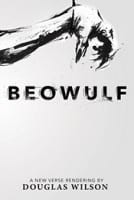Well, I have to admit that I am kind of whipped up about our pending release of Beowulf. This was a project I was kind of chipping away on in the background, and then the need for a usable version for the new Logos Press curriculum arose. So I got things in gear, and finished the manuscript last fall.
It has been in production since, and is now officially and safely at the printer. With that in mind, Canon wanted to offer a promotion for those who preorder, and so here’s the deal. If you order before October 8 (the official release date is Oct. 15), you will get your copy signed by me, and free shipping. Sorry, the free shipping doesn’t apply to international orders.
Here are some blurbs from the cover, followed by a sample of the first eleven lines.
“I’ve long been waiting for a rendering of Beowulf by someone sensitive to its muscular verse, its palette of irony that ranges from grim understatement to barely suppressed hilarity, its profound humanity and Christian faith. I’m waiting no longer — Douglas Wilson’s is the one, far more faithful to the original than Heaney’s or Raffel’s, and conceding absolutely nothing to theirs in sheer dramatic force. I will be ordering it for my students forthwith.” — Anthony Esolen, translator of Dante’s Divine Comedy, author of Ten Ways to Destroy the Imagination of Your Child, and professor of English at Providence College
“Douglas Wilson’s Beowulf conveys with admirable clarity the poem’s narrative and general character, and his commentary helps the studious reader to see how the poem reflects a time of cultural conflict and change.” — Richard Wilbur, United States Poet Laureate (1987), two-time Pulitzer Prize winner, and Chancellor Emeritus of the Academy of American Poets
“It is obvious that Douglas Wilson enjoyed himself immensely in rendering this Old English epic into the alliterative verse form of the original, and as a reader I found that this enjoyment energized the text. Beowulf is a story par excellence, and the most salient trait of Wilson’s version is that it flows beautifully.” — Leland Ryken, professor of English at Wheaton College and author of The Christian Imagination, and the Christian Guides to the Classics series
We are calling it a new verse rendering, as distinct from a translation, and what that all means is explained in the introduction. But what I tried to do is give a contemporary sense of how the original Anglo Saxon poetry would sound in modern English. Here is a sample.
Hear the song of spear-Danes from sunken years,
Kings had courage then, the kings of all tribes,
We have heard their heroics, we hold them in memory.
Shield Sheafson was one, scourge of all tribes,
Took a maul to the mead-benches, mangled his enemies.
He rose and in rising, he wrecked all his foes.
A foundling at first, he flourished in might,
A torrent of terror, war tested his mettle.
So he bested and broached the borders of nations;
The whale-road was wide but his warriors still crossed it.
Gold came, and glory . . . a good king that was!



Pre-ordered!!
I loved taking your Anglo-Saxon course at NSA, and I can still recite the Lord’s Prayer in Anglo-Saxon! (part of the final exam for those wondering).
I suspect the real reason for the good sales will be the way cool cover art.
Leland Ryken? Okay, I’m in.
Compare the meaty vigor of Doug’s version with “So. We have sung of the spear-Danes” (Heaney) and “Hear me! We’ve heard of Danish heroes” (Raffel). I’m almost tempted to read it again (having read Raffel once). Prefer “The Song of Roland,” though: more Christian and more straightforwardly heroic. (Not saying it’s better poetry or with better characterization.)
Great stuff.
Now if we could just get Christians to read the text of the Bible in a similar way.
And that’s a completely objective and unbiased opinion, right, Greg?
I love Beowulf and look forward to reading this because I have been blessed by Mr. Wilson’s other works. Beowulf would be the best opera ever written. Brave men, a regal queen, bees, dragons, she monsters, hanging claws, and feasting…What more could an opera want! If only someone would do that….
Oh boy! An unnecessary translation designed to continue shoving the insular world of Classical Christian education into a dustier corner where Herr Scholar Wilson can loom over it, counting the coins in his coffers. Half-educated homeschoolers will never know that Mr. Wilson isn’t even a seminarian, let alone a respected scholar of archaic languages. But who cares, they’ll buy it.
Mr. Wilson, when did you decide that the best way to cast a long shadow was to block the light?
Thomas, I commend the Introduction to you!
Thomas can even read the intro for freesies on Amazon.
Here’s the URL straight up: http://www.amazon.com/Beowulf-Douglas-Wilson/dp/159128130X/ref=sr_1_1?ie=UTF8&qid=1380460599&sr=8-1&keywords=beowulf+wilson#reader_159128130X
And here’s an attempted hyperlink, in the off chance that might be working today: <a href=”http://www.amazon.com/Beowulf-Douglas-Wilson/dp/159128130X/ref=sr_1_1?ie=UTF8&qid=1380460599&sr=8-1&keywords=beowulf+wilson#reader_159128130X”>here’s a hyperlink</a>.
(Gaaah! Why did I go look? I found a hyphenation inconsistency!)
Thomas, if he’s so terrible at what he does, why are these people saying this about the book? “I’ve long been waiting for a rendering of Beowulf by someone sensitive to its muscular verse, its palette of irony that ranges from grim understatement to barely suppressed hilarity, its profound humanity and Christian faith. I’m waiting no longer — Douglas Wilson’s is the one, far more faithful to the original than Heaney’s or Raffel’s, and conceding absolutely nothing to theirs in sheer dramatic force. I will be ordering it for my students forthwith.” —Anthony Esolen, translator of Dante’s Divine Comedy, author of Ten Ways to Destroy… Read more »